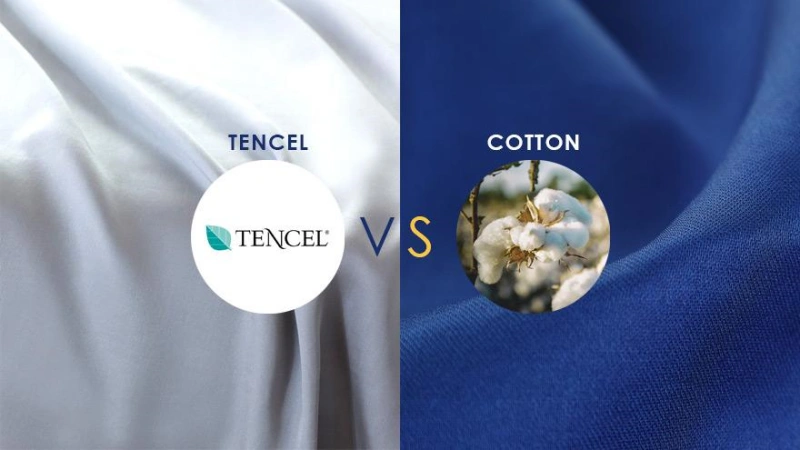
You may wonder, is tencel non toxic? The answer is no. Tencel holds top certifications like OEKO-TEX® Standard 100 and GOTS, ensuring safety from harmful chemicals. Friendtex crafts its Tencel Pajamas using only certified, non-toxic materials and an eco-friendly process.
These pajamas offer you a hypoallergenic and gentle touch, perfect for sensitive skin. As Tencel’s market share grows, its reputation for safety and comfort stands out among sustainable textiles.
Key Takeaways
Tencel fabric is non-toxic and safe for sensitive skin, backed by medical testing and certifications like OEKO-TEX and GOTS.
The production of Tencel uses a closed-loop process with a non-toxic solvent, recycling 99% of chemicals to protect the environment and your health.
Tencel is hypoallergenic, soft, and moisture-wicking, making it ideal for people with allergies, eczema, or sensitive skin.
Compared to cotton, synthetics, and bamboo, Tencel offers better skin comfort and a lower environmental impact.
Choosing certified Tencel products, like Friendtex pajamas, ensures you get safe, eco-friendly, and high-quality fabric that supports both your skin and the planet.
Is Tencel Fabric Toxic?
When you ask, “Is Tencel toxic?” you want clear, science-backed answers. Tencel™ fabric stands out as a non-toxic alternative in the textile world. Medical testing by the Fördergemeinschaft Körperverträgliche Textilien e.V. (FKT) awarded Tencel the “MEDICALLY TESTED – TESTED FOR TOXINS” label.
This certification means Tencel™ fabric meets strict standards for body compatibility and does not release harmful substances when in direct contact with your skin. The FKT certification aligns with medical device approval standards, so you can trust that Tencel™ fabric is safe for sensitive skin and everyday wear.
Tencel™ Fabric Production
Tencel™ fabric, also known as lyocell fiber, begins with sustainably sourced natural raw wood fibers, often from eucalyptus trees. The production process is designed for safety and sustainability. Here’s how Tencel™ fabric is made:
Manufacturers chip logs from certified forests into small pieces.
They soften the wood chips into pulp using safe, controlled methods.
The dried pulp dissolves in N-Methylmorpholine N-oxide (NMMO), a non-toxic solvent.
The cellulose solution is filtered for purity.
The solution is extruded through spinnerets, forming lyocell fibers.
Fibers are washed, dried, and finished for softness and strength.
The final lyocell fiber is spun into yarn and woven into Tencel™ fabric.
Note: The entire process is produced in a closed loop. Over 99% of the NMMO solvent is recovered and reused, which leads to a significant reduction in chemical impact and waste. By-products are converted into biofuel, supporting a circular economy and minimizing environmental and health risks.
This method utilizes less toxic solvents compared to traditional viscose or rayon production. The closed-loop system ensures that almost no harmful chemicals escape into the environment, making Tencel™ fabric a leader in eco-friendly textiles.
Chemical Safety
You may wonder about the chemicals used in Tencel™ fabric and their safety. The main solvent, NMMO, is non-toxic and biodegradable. Unlike the harsh chemicals found in other fabric manufacturing, NMMO does not pose health risks when handled properly in the closed-loop system.
Additional additives, such as softeners and antistatic agents, are carefully selected to maintain the integrity and comfort of the lyocell fiber.
Manufacturers like Friendtex follow strict regulatory and industry standards. They use certified, non-toxic Tencel in their pajamas, ensuring that every product is safe for you and your family.
Friendtex’s Tencel™ fabric holds certifications such as OEKO-TEX® Standard 100 and GOTS, which guarantee that no toxic substances remain in the finished garment.
Tencel™ fabric production:
Uses a non-toxic solvent (NMMO)
Recycles 99% of chemicals in a closed-loop system
Minimizes environmental and human health risks
Fabric Type | Main Solvent Used | Toxicity Level | Closed-Loop Process | Environmental Impact |
|---|---|---|---|---|
Tencel™ (Lyocell) | NMMO | Non-toxic | Yes | Low |
Viscose/Rayon | Carbon disulfide | Toxic | No | High |
Modal | Sodium hydroxide | Moderate | Partial | Moderate |
Tencel™ fabric offers a clear reduction in chemical impact compared to other fibers. The lyocell fiber process ensures that you get a fabric that is gentle, safe, and sustainable.
Friendtex’s commitment to certified, non-toxic Tencel means you can wear their pajamas with confidence, knowing you have chosen a product that cares for your skin and the planet.
Tencel and Sensitive Skin

Hypoallergenic Qualities
If you have sensitive skin, you know how important it is to choose fabrics that do not cause irritation. Tencel™ fabric stands out for its hypoallergenic properties. The surface of lyocell fiber feels smoother and gentler than cotton, which helps reduce friction and skin irritation.
You benefit from a fabric that absorbs moisture quickly and allows your skin to breathe, helping prevent flare-ups of eczema or dermatitis. Tencel and Lyocell excel in softness and moisture management, making them excellent choices for people with allergies or delicate skin.
Tencel Modal offers a silky smooth texture that reduces itching, redness, and discomfort compared to synthetic fabrics.
Tencel Lyocell is eco-friendly and comes from renewable wood sources, supporting both your skin and the environment.
Both types of lyocell fiber wick away sweat, keeping your skin dry and comfortable.
Clinical studies support these benefits. In a trial with people who have atopic dermatitis, participants preferred lyocell over cotton for softness, temperature control, and moisture management.
Many noticed less itching and better skin comfort when wearing lyocell clothing. Tencel is also recommended for babies and infants due to its gentle, chemical-free, and non-toxic qualities.
Friendtex Tencel Pajama Benefits
You want pajamas that feel soft, cool, and safe against your skin. Friendtex Tencel Pajamas deliver on all fronts. Customers describe these pajamas as “cool and cloud-like,” highlighting their breathability and luxurious feel.
The fabric’s excellent thermoregulation and moisture-wicking properties help you stay comfortable all night, even if you have sensitive skin or experience night sweats.
Friendtex uses certified Tencel and lyocell fiber in its pajamas, ensuring every piece meets strict safety and environmental standards. The pajamas hold OEKO-TEX® and GOTS certifications, which guarantee that no harmful substances touch your skin.
Friendtex’s commitment to quality and sustainability means you get a product that is gentle, hypoallergenic, and non-toxic. Many boutiques reorder these pajamas, showing strong customer satisfaction among those with skin sensitivities.
Tip: If you have allergies or sensitive skin, choosing Friendtex Tencel Pajamas can help you avoid irritation and enjoy a restful night’s sleep.
Tencel™ Fabric vs Other Fabrics
When you compare Tencel vs. other fabrics, you see clear differences in safety, comfort, and environmental impact. Tencel™ fabric stands out as a leader among sustainable textiles, offering you a hypoallergenic, eco-friendly, and non-toxic choice.
Friendtex offers a wide range of eco-friendly fabrics, including tencel, bamboo, modal, and organic cotton, so you can choose what is better for people and the planet.
Tencel vs Cotton

Tencel and cotton both come from natural sources, but their impact on your skin and the environment differs. Tencel is hypoallergenic and has a smooth, silk-like texture that rarely irritates sensitive skin. Cotton, while soft, does not always prevent allergic reactions, and it often uses more pesticides during farming.
Tencel requires less water and energy to produce, making it more environmentally sustainable. You also benefit from Tencel’s moisture-wicking and breathable qualities, which help keep your skin dry and comfortable.
Feature | Tencel (Lyocell) | Cotton |
|---|---|---|
Skin-Friendliness | Hypoallergenic, smooth | Soft, not hypoallergenic |
Water Use | Low | High |
Chemical Use | Minimal, closed-loop | High (pesticides, dyes) |
Biodegradability | Yes | Yes |
Eco-Friendly | Yes | Sometimes (organic) |
Tencel vs Synthetics
When you look at Tencel vs. other fabrics like synthetics, the differences become even clearer. Tencel comes from sustainably sourced wood pulp, while synthetics like polyester use petroleum. Tencel uses a closed-loop process that recycles 99% of solvents, reducing chemical waste.
Synthetic fabrics require harsh chemicals and release microplastics into the environment. Tencel is biodegradable and better for people and the planet, while synthetics persist in landfills and can irritate sensitive skin.
Choosing Tencel means you avoid toxic chemicals and support environmentally sustainable practices.
Tencel vs Bamboo and Modal
Tencel, bamboo, and modal all offer soft, breathable, and skin-friendly options. However, bamboo fabric often undergoes harsh chemical processing, which can affect both your skin and the environment. Modal, a type of tencel fiber, shares many of tencel’s hypoallergenic and eco-friendly qualities but uses more chemicals than lyocell.
Dermatological research shows that Tencel is hypoallergenic, antibacterial, and gentle, making it ideal for sensitive skin. Bamboo is naturally antimicrobial, but may not always be as eco-friendly due to its processing.
Tencel: Hypoallergenic, eco-friendly, and gentle on skin.
Bamboo: Soft and antimicrobial, but often processed with harsh chemicals.
Modal: Smooth, breathable, and durable, with moderate environmental impact.
Friendtex’s collection includes tencel, modal, bamboo, and organic cotton pajamas, giving you access to eco-friendly fabrics that are better for people and the planet. You can trust that each fabric option supports your comfort and environmental values.
Choosing Safe Tencel Products
Certifications and Standards
When you shop for tencel products, certifications help you identify safe and non-toxic options. Look for labels such as OEKO-TEX Standard 100, GOTS (Global Organic Textile Standard), and FSC.
These certifications confirm that the fabric is free from harmful chemicals and safe for direct skin contact. The TENCEL trademark also guarantees the authenticity of lyocell fiber. Products with the EU Ecolabel meet high environmental standards throughout their lifecycle.
Friendtex holds multiple certifications, including OEKO-TEX, GOTS, and FSC, reflecting a strong commitment to environmentally friendly practices and sustainable fashion.
You can trust that Friendtex’s quality control system, which includes professional inspection and precise manufacturing, ensures the safety and purity of every tencel pajama.
Dyes and Finishing
The dyes and finishing agents used in Tencel fabrics can impact your skin, especially if you have sensitivities. Manufacturers often use enzyme baths to control pilling and maintain a smooth surface. Some dyeing processes require special care because lyocell fibers have low surface energy, making dye binding more challenging.
Always check for products dyed with low-impact or OEKO-TEX approved dyes. Avoid garments with finishes containing formaldehyde or PFCs. Friendtex uses advanced technology and strict oversight to ensure that all dyes and finishes meet international safety standards, supporting an eco-friendly and skin-safe product.
Aspect | Recommendation |
|---|---|
Dyes | Choose low-impact or OEKO-TEX-approved dyes |
Finishing Agents | Prefer enzyme-based, non-toxic finishes |
Labels | Look for “formaldehyde-free” and “PFC-free” |
Tips for Sensitive Skin
If you have sensitive skin, you should prioritize tencel products with smooth surfaces and moisture-wicking properties. Dermatologists recommend Tencel for its ability to minimize friction and reduce irritation. Clinical studies show that people with eczema or dermatitis experience less redness and itching when wearing Tencel clothing.
For extra protection, look for garments enhanced with zinc, which can soothe inflammation and inhibit bacterial growth. Friendtex’s tencel pajamas offer hypoallergenic comfort, breathability, and durability, making them an excellent choice for sensitive skin.
By choosing certified, eco-friendly Tencel products, you support an environmentally sustainable future while caring for your skin.
Conclusion
You deserve comfort and peace of mind when choosing sleepwear. Friendtex Tencel Pajamas provide a non-toxic, hypoallergenic, and sustainable option that’s perfect for sensitive skin.
The fabric’s breathable, moisture-wicking properties, along with its silky softness, help prevent irritation while keeping your skin dry and comfortable throughout the night.
Produced using certified methods with non-toxic chemicals and a closed-loop process, Friendtex Tencel Pajamas support both your health and the environment.
FAQ
Is Tencel fabric safe for people with allergies?
Yes, Tencel fabric is hypoallergenic. You can wear it if you have allergies or sensitive skin. The smooth fibers reduce irritation and help prevent allergic reactions.
Do Friendtex Tencel Pajamas contain harmful chemicals?
No, Friendtex Tencel Pajamas use certified, non-toxic materials. You get pajamas free from harmful chemicals, thanks to OEKO-TEX® and GOTS certifications.
How do I care for Tencel pajamas to keep them safe for my skin?
You should machine wash your Tencel pajamas in cold water. Avoid bleach. Tumble dry on low heat. This care routine keeps the fabric soft and safe for sensitive skin.
Can Tencel fabric help with night sweats?
Yes, Tencel fabric wicks moisture away from your skin. You stay dry and comfortable throughout the night. This makes it a great choice if you experience night sweats.
What certifications should I look for when buying Tencel products?
Look for OEKO-TEX® Standard 100, GOTS, and FSC certifications. These labels ensure your Tencel product is safe, non-toxic, and environmentally friendly.
Is tencel lyocell toxic?
Tencel Lyocell is a non-toxic fabric made from sustainably sourced wood pulp, primarily from eucalyptus, beech, and spruce trees. The production process uses a closed-loop system, which recycles water and solvents, minimizing environmental impact.
Tencel fabric is free of harmful chemicals, making it safe for sensitive skin. You can confidently use Tencel in your pajamas, knowing that it’s gentle on the skin and eco-friendly. Consumers today appreciate brands that prioritize sustainability and safety, so promoting Tencel’s eco-conscious and non-toxic qualities will resonate well with eco-conscious buyers.
Is Tencel Healthy to Wear?
Tencel is a naturally breathable fabric that regulates temperature, wicks away moisture, and resists bacterial growth. These properties make it an ideal choice for sleepwear, as it keeps you cool and dry throughout the night.
The smooth surface of Tencel prevents irritation, and it’s gentle enough for even the most sensitive skin. Since Tencel is hypoallergenic and biodegradable, it’s not just a healthy option for your customers but also an environmentally responsible one. Highlighting these benefits can help your brand stand out in the market.


